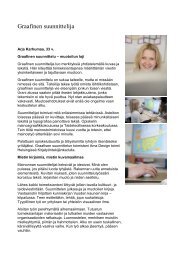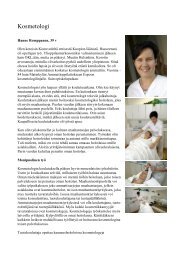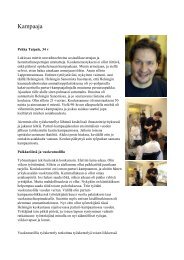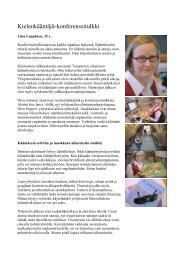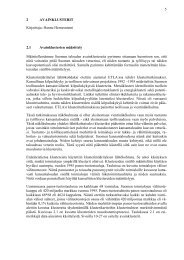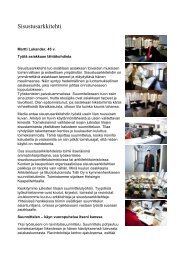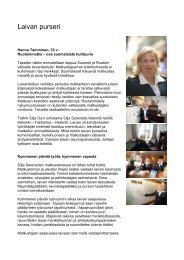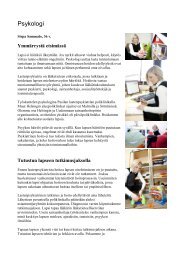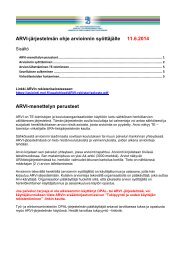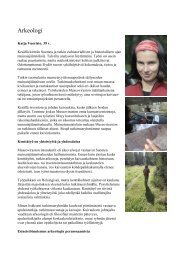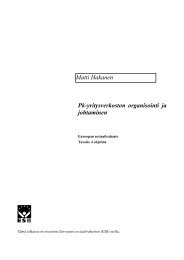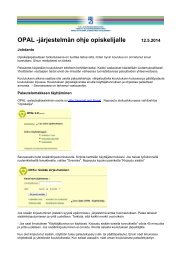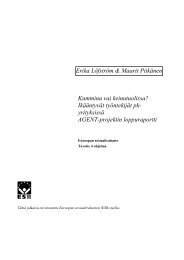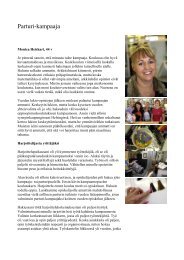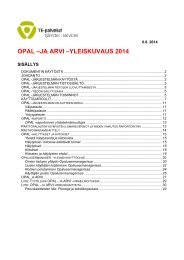Working Life Barometer in the Baltic Countries 2002 (pdf) - mol.fi
Working Life Barometer in the Baltic Countries 2002 (pdf) - mol.fi
Working Life Barometer in the Baltic Countries 2002 (pdf) - mol.fi
Create successful ePaper yourself
Turn your PDF publications into a flip-book with our unique Google optimized e-Paper software.
248<br />
is particularly great. In <strong>the</strong> view of many, <strong>the</strong> employment situation <strong>in</strong> a year's<br />
time may be much worse. There are very few who th<strong>in</strong>k that it will be much<br />
better.<br />
In Lithuania <strong>in</strong> 1998, <strong>the</strong>re was a lot of scepticism as regards development <strong>in</strong><br />
employment. Now, though, <strong>the</strong> situation has evened out. In <strong>2002</strong>, <strong>the</strong> expectations<br />
<strong>in</strong> Estonia concern<strong>in</strong>g employment turned out to be more negative than<br />
<strong>in</strong> <strong>the</strong> o<strong>the</strong>r two countries. Only 15 per cent of <strong>the</strong> Estonians expect that employment<br />
will improve dur<strong>in</strong>g <strong>the</strong> com<strong>in</strong>g year, and 50 per cent believe that it<br />
will deteriorate. Only one per cent expect <strong>the</strong> situation to be much better <strong>in</strong> a<br />
year's time. By contrast, many times that number - 14 per cent - reckon that it<br />
will be much worse.<br />
The development <strong>in</strong> <strong>the</strong> economy of one's own workplace dur<strong>in</strong>g <strong>the</strong> com<strong>in</strong>g<br />
year is viewed considerably more optimistically than <strong>the</strong> general employment<br />
development. For <strong>the</strong> workplace economy also, <strong>the</strong> expectations are <strong>the</strong> most<br />
positive <strong>in</strong> Latvia. Future trends <strong>in</strong> this aspect are clearly regarded <strong>the</strong> most<br />
unfavourably <strong>in</strong> Lithuania.<br />
In both Estonia and Latvia, positive expectations have <strong>in</strong>creased dur<strong>in</strong>g <strong>the</strong><br />
three years. The development <strong>in</strong> Lithuania has been <strong>the</strong> opposite. There, <strong>in</strong><br />
1998, one-<strong>fi</strong>fth reckoned that <strong>the</strong> economy at <strong>the</strong>ir own workplace was gett<strong>in</strong>g<br />
worse. Now, <strong>the</strong> correspond<strong>in</strong>g proportion has grown to over one-third, 34 per<br />
cent. The percentage of favourable expectations, however, has stayed more or<br />
less <strong>the</strong> same. The Lithuanians' expectations are somewhat contradictory, because<br />
<strong>the</strong>y believe more than before that employment <strong>in</strong> general will improve,<br />
but at <strong>the</strong> same time <strong>the</strong>ir belief <strong>in</strong> <strong>the</strong> economy of <strong>the</strong>ir own workplace has<br />
weakened. In Estonia and Latvia, <strong>the</strong> evaluation goes <strong>in</strong> <strong>the</strong> same direction for<br />
both aspects.<br />
Men's and women's expectations as regards employment differ only a little<br />
from each o<strong>the</strong>r. In all three countries, both <strong>the</strong> male and <strong>the</strong> female workers<br />
have estimated less often than before that <strong>the</strong> general employment situation is<br />
gett<strong>in</strong>g worse. Among <strong>the</strong> men, <strong>the</strong> change has been slightly greater than for<br />
<strong>the</strong> women. With <strong>the</strong> exception of Lithuania, <strong>the</strong> changes <strong>in</strong> positive assessments<br />
have been small for both males and females.



